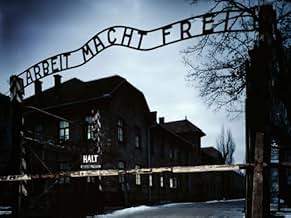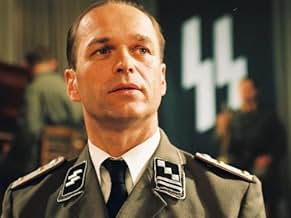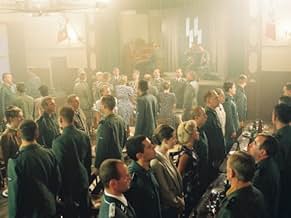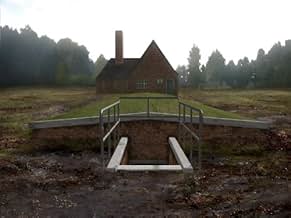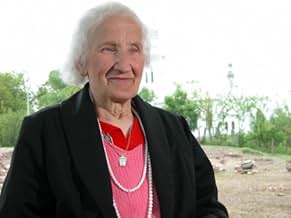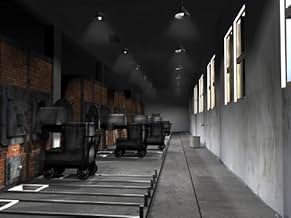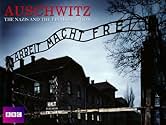Auschwitz: The Nazis & the 'Final Solution'
- Minissérie de televisão
- 2005
- 48 min
AVALIAÇÃO DA IMDb
8,6/10
4,8 mil
SUA AVALIAÇÃO
Adicionar um enredo no seu idiomaThe history of the Final Solution phase of the Nazi Holocaust, particularly with the most infamous of the death camps.The history of the Final Solution phase of the Nazi Holocaust, particularly with the most infamous of the death camps.The history of the Final Solution phase of the Nazi Holocaust, particularly with the most infamous of the death camps.
Explorar episódios
Avaliações em destaque
This is a superbly produced documentary, based largely on information that has come to light since information from the eastern bloc countries and former Soviet Union became accessible.
The documentary comprises mainly of interviews with surviving SS soldiers and surviving prisoners from the Auschwitz and similar camps. It uses CGI special effects, combined with film of the Auschwitz camps to achieve the most realistic reconstruction of how it looked, and how it operated. Dramatisations of various meetings and events have been authentically reconstructed with well cast actors.
The stories from the survivors, particular in the episode about children, are the most moving I've ever seen in a documentary. The combination of original photographs, moving music and a first hand account from a survivor make these stories most poignant.
It does not demonize the Nazi's, but gives in insight into the mentality that pervaded the regime. It shows them as lacking empathy. We see evidence that not only the Germans, but many French, many Hungarians and many Slovakians were only too willing to help deport their Jews; even the British Police, on the Nazi occupied Channel Islands, were willing to send Jews to the east. Finally, the documentary shows how the surviving Jews, or their return to their homeland, were treated badly by their fellow countrymen.
This documentary shows that what happened in the holocaust happened because humans, not just Nazi's, are capable doing terrible things to humanity, given a certain set of circumstances.
The documentary comprises mainly of interviews with surviving SS soldiers and surviving prisoners from the Auschwitz and similar camps. It uses CGI special effects, combined with film of the Auschwitz camps to achieve the most realistic reconstruction of how it looked, and how it operated. Dramatisations of various meetings and events have been authentically reconstructed with well cast actors.
The stories from the survivors, particular in the episode about children, are the most moving I've ever seen in a documentary. The combination of original photographs, moving music and a first hand account from a survivor make these stories most poignant.
It does not demonize the Nazi's, but gives in insight into the mentality that pervaded the regime. It shows them as lacking empathy. We see evidence that not only the Germans, but many French, many Hungarians and many Slovakians were only too willing to help deport their Jews; even the British Police, on the Nazi occupied Channel Islands, were willing to send Jews to the east. Finally, the documentary shows how the surviving Jews, or their return to their homeland, were treated badly by their fellow countrymen.
This documentary shows that what happened in the holocaust happened because humans, not just Nazi's, are capable doing terrible things to humanity, given a certain set of circumstances.
I'm not a Jew so I have no axe to grind.
This is probably the most comprehensive account of the most infamous death-camp of them all. Not only are ex-inmates interviewed, but also ex-SS guards who are extraordinarily candid about their work & their attitude to the prisoners. The whole machinery involved in the organisation & efficiency of what amounted to an entire murder camp system.
This 6 part documentary cannot be ignored, once you have seen the evidence & heard the testimony there will be no doubt in your mind. It did happen & it was done by people not much different from the rest of us.
It cannot be allowed to happen again.
This is probably the most comprehensive account of the most infamous death-camp of them all. Not only are ex-inmates interviewed, but also ex-SS guards who are extraordinarily candid about their work & their attitude to the prisoners. The whole machinery involved in the organisation & efficiency of what amounted to an entire murder camp system.
This 6 part documentary cannot be ignored, once you have seen the evidence & heard the testimony there will be no doubt in your mind. It did happen & it was done by people not much different from the rest of us.
It cannot be allowed to happen again.
10alantas
I watched a lot of documentaries about the Nazi state recently. My purpose is to understand the events, the effects, that led to this horrendous massacre. This one is definitely one of the best in depth analysis and reconstruction of events. The main cause, everyone should watch these films beyond remembering, is that we still live in the system which produced the radical nationalist party that rose to power and destroyed 55 million people. Stupidity and despair hand in hand can go farther we can imagine. A lot of us think it can't happen again. But it can and is happening. No one can question the importance of these films ever. They should air this on every national television and then the people should be more aware, what it means when radicals march in uniforms on our streets as it happened not long ago in my country. Uniforms are banned, but that happened in Germany as well before they seized power. The threat is alive!
A lot of witnesses testify in this film, about the brutal truth. You may feel how crazy and surreal it all was. But the people who took part in the genocide felt justified to do it. And they thought they doing the right thing. If you want to understand in depth how it happened you may get closer by watching this film. Highly recommended!
A lot of witnesses testify in this film, about the brutal truth. You may feel how crazy and surreal it all was. But the people who took part in the genocide felt justified to do it. And they thought they doing the right thing. If you want to understand in depth how it happened you may get closer by watching this film. Highly recommended!
TV often fails to convey complex information: both in facts and emotionally; instead it mostly serves up the obvious with images to trick our eyes.
This documentary sets a new standard: the research is impeccable, the interviews gripping, the production perfect in every respect and finally the horror, the terrible horror of what humans can do, is absolutely clear. A history book could not do a better job.
One of the best and bravest aspects of the series is when the interviewers ask a person how they felt about a murder they committed: did they regret it, how do they feel about it now? Those interactions make it worth watching the series alone.
This documentary sets a new standard: the research is impeccable, the interviews gripping, the production perfect in every respect and finally the horror, the terrible horror of what humans can do, is absolutely clear. A history book could not do a better job.
One of the best and bravest aspects of the series is when the interviewers ask a person how they felt about a murder they committed: did they regret it, how do they feel about it now? Those interactions make it worth watching the series alone.
10olivbcn
Laurence Rees tells the most appalling story you have ever heard. Though the documentary is centred on the history of Auschwitz concentration and extermination camp, it also explains the Holocaust as a whole. 'Auschwitz' is made up of 4 elements: Dramatic reconstruction with native actors, high quality computer generated imagery, interviews of eye-witnesses, and astonishing archive footage. The actors play honestly their characters, and perfectly show the unforgivable and cold minded zeal of SS men. The interviews of (former?) Nazis and victims give a crucial human touch to this documentary. The BBC proves, one more time, that quality can go along with TV programme.
Você sabia?
- CuriosidadesTodas as entradas contêm spoilers
- Versões alternativasIn Spain, on January 29, 2005, a 104-minute cut was premiered on television. Hosted by the actress María Galiana, and with additional interviews to the Spanish survivors Jaume Álvarez, Enric Marcó and Neus Català. And co-produced by Sagrega TV, SA.
- ConexõesFeatured in Ein Tag in Auschwitz (2020)
Principais escolhas
Faça login para avaliar e ver a lista de recomendações personalizadas
- How many seasons does Auschwitz: Inside the Nazi State have?Fornecido pela Alexa
Detalhes
- Data de lançamento
- Países de origem
- Central de atendimento oficial
- Idioma
- Também conhecido como
- Auschwitz: Inside the Nazi State
- Locações de filme
- Empresas de produção
- Consulte mais créditos da empresa na IMDbPro
- Tempo de duração
- 48 min
- Cor
- Mixagem de som
- Proporção
- 1.78 : 1
Contribua para esta página
Sugerir uma alteração ou adicionar conteúdo ausente

